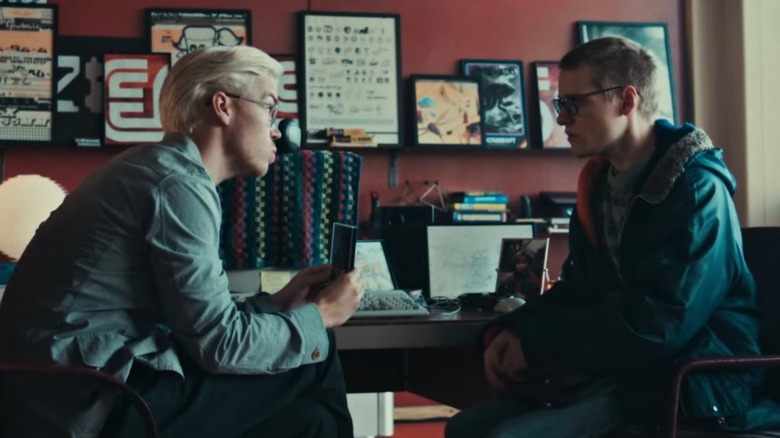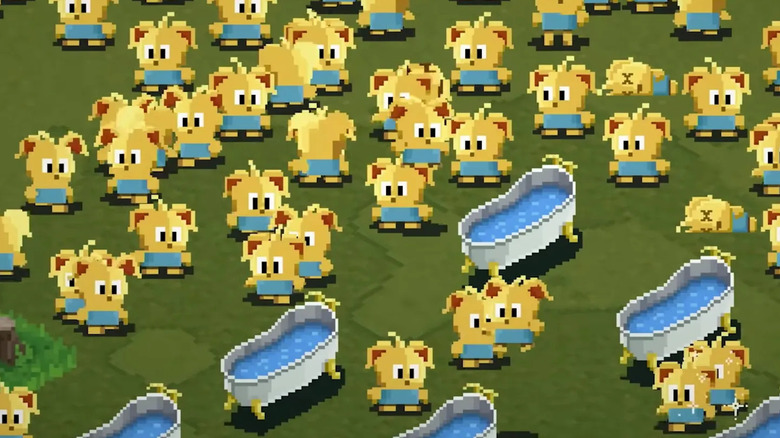Black Mirror Has An Addictive Companion Video Game You Likely Never Knew Existed
Charlie Brooker's "Black Mirror" has been darkly interrogating our relationship with media and technology since 2011, and since we're more into our screens than ever, it stands to reason that this show, which is essentially "The Twilight Zone" for our times, is more disturbingly relevant than ever.
A veteran gamer who got his start as a reviewer for the magazine PC Zone, Brooker takes the video game medium seriously. He's far from a scold as far as gaming is concerned, but he does have piercing insight into the ways in which people can become unhealthily obsessed with these virtual environments. We can grow irritated when a game throws a particularly difficult mission or seemingly unbeatable boss level in front of us, yet we get so attached to avatars or characters that it feels like a death in the family when/if they expire.
It's possible that no film or television writer is more qualified to satirize the video game industry than Brooker, and he certainly rose to the challenge with 2018's ambitious "Bandersnatch," an interactive "Black Mirror" feature directed by David Slade that required the viewer to make choices for its programmer protagonist, Stefan (Fionn Whitehead), as he attempts to adapt a choose-your-own-adventure book into a video game. Stefan's unhappy childhood plays a major role in his struggles, so the viewer can occasionally find themselves making decisions based on the emotion of any given moment rather than doing the prudent thing (although sometimes the prudent thing is also a bad idea). In the end, "Bandersnatch" was more of a first-person morality play than a game industry satire, but Brooker wasn't done with this world.
When the latest season of "Black Mirror" hit Netflix last April, viewers were excited to dive back into the "Bandersnatch" timeline with the episode "Plaything." If they were disappointed at first to discover that there was no interactive element to this tale, they were likely delighted when the trailer offered a QR code to the game-within-the-episode. Was it worth the effort Netflix's game developers put into making it?
Plaything thrusts viewers back into the pitch-dark Bandersnatch universe
"Plaything" is the fourth episode of "Black Mirror" season 7 (you can read /Film's review of the whole thing here), and, for "Bandersnatch" fans, it was certainly a thrill to check back in with Will Poulter's off-center programmer Colin Ritman. The episode stars Peter Capaldi and Lewis Gribben as, respectively, the older and younger version of PC Zone reviewer Cameron Walker. While working for PC Zone, Walker steals a copy of Ritman's new game, "Thronglets," which the designer claims is populated with sentient digital creatures.
While under the influence of LSD, Walker forms an unusual bond with the Thronglets. He believes he can communicate with them and upgrades his home computer so he can speak directly to them. When his layabout roommate logs on to his computer and cruelly kills off many of the Thronglets, an enraged Walker kills and dismembers him. Eventually, Walker and the Thronglets merge as one, which leads to the creatures essentially reprogramming the consciousness of every human being on the planet.
It's a funny-scary moment — one that Brooker and Netflix decided would be fun as a playable game in our very real and increasingly weird world.
The Thronglets are waiting to play with you in the Bandersnatch universe
In an interview with The Hollywood Reporter, Sean Krankel, the head of Netflix's Night School Studio, revealed that "Plaything" offered the company's game developers an ideal opportunity to make a tie-in game to one of their shows. And while "Thronglets" is a modest creation that allows for around three hours of total playtime, it does force players to make difficult decisions about the well-being of the Thronglets (who really don't like being misled or abused).
Most people who've taken a crack at "Thronglets" have found it to be an appropriately twisted take on app games that invariably leads you into a very "Black Mirror" conclusion. So, really, this alone allows it to stand out from your garden variety time-waster. That said, it's an incredibly light lift for Netflix's fledgling game division, akin to the myriad of movie tie-ins that found their way to the NES in the late 1980s and early '90s. Back then, every major studio movie was grist for a video game offshoot. This is how we got cartridges for "Jaws: The Revenge," "Hudson Hawk," and, no joke, "Platoon." This is a strange thing to laud.
Evidently, Netflix's Night School Studio was something of a selling point when it struck its "Sesame Street" deal, so we can probably expect more sophisticated output from these folks. For now, feel free to download "Thronglets" to your phone and feel like a bad person for three hours.


